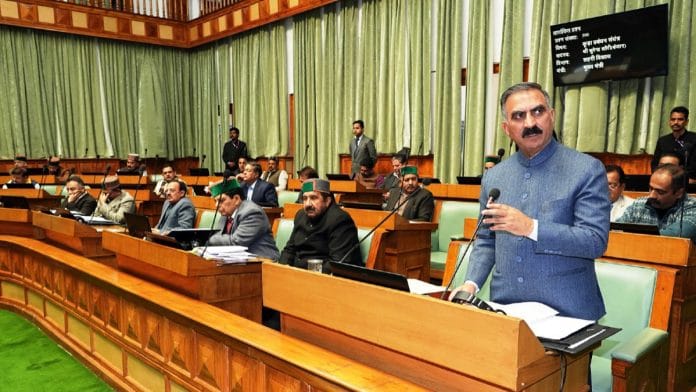Shimla: The Himachal Pradesh government has constituted a panel of legislators to study the various aspects of legalising hemp cultivation and submit a report in this regard to the chief minister within a month.
Legalisation of hemp cultivation has been a long-standing demand in the hill state, with legislators across party lines raising it time and again. An annual state police report from 2022 suggests that more than 2,000 acres in Himachal Pradesh are under illegal cannabis cultivation.
On Thursday, Bharatiya Janata Party (BJP) MLA Puran Chand Thakur had moved a resolution in the assembly, seeking legalisation of hemp cultivation.
Taking part in the discussion, Chief Minister Sukhvinder Singh Sukhu said a panel of MLAs headed by revenue minister Jagat Singh Negi would be formed to look into the issue. The proposal was accepted by Speaker Kuldeep Singh Pathania.
“The committee will visit areas where cannabis could be grown. It will study all the aspects and submit a report within one month,” Sukhu told the Vidhan Sabha Friday. He added that the state would enact a law after studying the panel’s report and that the panel would also look into the social and scientific repercussions of hemp cultivation.
Besides Negi, the panel will comprise Kullu MLA Sundar Singh Thakur, legislators Surender Shourie, Janak Raj and Puran Chand Thakur. Shourie represents Banjar in Kullu district, while Raj is the MLA of Bharmour in Chamba district and Thakur of Darang in Mandi district.
Speaking To ThePrint, Negi said the panel would also study the medicinal value of cannabis. “Cannabis has medicinal value. It is a fact that cannabis is used for drug abuse but we have law enforcement agencies to check it. Controlled cultivation and utilisation of cannabis will yield jobs and revenue both,” he said.
Sundar Singh Thakur, the MLA from Kullu who is also chief parliamentary secretary, said legalising cannabis cultivation would generate revenue and create jobs for locals. “Uttarakhand has legalised cannabis cultivation. Haryana and J&K are other states that have such a policy.”
In July 2018, neighbouring Uttarakhand became the first Indian state to legalise hemp cultivation. The Uttarakhand government supports several self-help groups and startups engaged in hemp farming under a purchasing-power-parity model, said a Himachal Pradesh excise official.
In his 2021 budget speech, then Himachal CM Jairam Thakur had proposed the legalisation of hemp cultivation for select purposes. “Cannabis produced in the state is of high quality and there is potential to undertake its controlled cultivation. Under the Narcotic Drugs and Psychotropic Substances (NDPS) Act, 1985, there are provisions for the cultivation, production, maintenance and transportation of cannabis,” he had said.
In view of demand from residents, the state had also drafted an approach paper listing modalities to permit the “industrial and medicinal” use of cannabis. A state government official, requesting anonymity, said the previous government had estimated that controlled cultivation could yield an additional annual revenue of Rs 18,000 crore.
“Cannabis seed is part of food, and the leaves are used for making footwear and ropes. But we should not move ahead in a hush-hush manner. We have to look for ways to ensure that relaxations are not misused,” former CM Thakur told ThePrint Friday.
‘Nasha (narcotic) to dawa (medicine)’
Although hemp cultivation was declared illegal in India with the promulgation of the NDPS Act in 1985, provisions in the law permit controlled cultivation for industrial purposes. In 2019, a bench of the Himachal Pradesh High Court directed the state government to take a call on issuing licences for the cultivation of cannabis for medicinal and industrial uses.
The Himachal Pradesh Police’s 2022 annual report suggests that illegal cannabis is cultivated on around 2,400 acres in state. A senior police officer, who was part of an anti-drug campaign in the state, said cannabis is grown illegally in Shimla, Kullu, Mandi, Chamba and Sirmaur districts. “While uprooting cannabis plants, we found some new varieties. It means hybrid seed was used for the cultivation,” he said.
“Controlled cannabis cultivation will convert it from nasha (narcotic) to dawa (medicine). Once controlled cultivation is allowed, illegal use of it would surely decrease,” the officer added.
Some NGOs and self-help groups in Kullu district have even trained women to make footwear, ropes and other handicrafts from hemp. “This (controlled cultivation) will make cannabis cultivation a source of clean money,” said Jamna Devi, who is part of a self-help group in Jibhi, Kullu.
Former Mandi MP Maheshwar Singh, who has been demanding the legalisation of hemp cultivation for some time now, told ThePrint, “I raised this issue in Parliament too. Cannabis has so many good qualities and legalising it would help in boosting the economy of the cash-strapped hill state.”
A scion of the erstwhile Kullu royal house, Singh said cannabis is used in the hill state for making footwear and rope. There are many non-narcotic uses of cannabis, which is also useful for treating some diseases, he added.
Dr Surender Kumar Sharma, a retired Ayurveda doctor, said cannabis is used in Ayurveda for treating arthritis, asthma, warts, cough, and a number of other medical conditions.
MLA Dr Janak Raj, who is a neurosurgeon by vocation and a member of the government’s newly-formed panel, also spoke about the medicinal uses of cannabis. “I have some patients who import their medicines from abroad. The medicine contains cannabis content and is costly. We have the same stuff in our back yard but are not reaping its benefits,” he added.
“Cannabis has tetrahydrocannabinol (THC), which is used in the medical line, especially in the treatment of cancer and neurological problems. It is also used in the treatment of ulcers,” he added.
(Edited by Amrtansh Arora)






